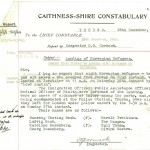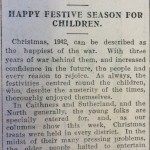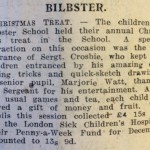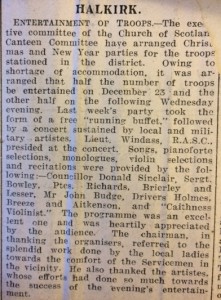On 28 December the Vichy French commander surrendered Somaliland to the Allies. And on 31 December German ships were defeated when they attacked a British convoy in the Battle of the Barents Sea: from now on Hitler would abandon using surface raiders in favour of U-boats.
After more than three years of war, the close of 1942 offered a glimmer of hope to the Allies: the German Sixth Army was surrounded at Stalingrad and faced the severity of the Russian winter without supplies or hope of rescue; Rommel had been decisively defeated and was trapped in North Africa; an Allied army had landed in North Africa and was slowly pushing the Germans back; and the Japanese advance had been halted and, in places, reversed. In retrospect, 1942 marked the turning point of the war: though two and a half years of fighting still lay ahead before victory would finally be achieved.
 In some ways, the New Year began much like the old with the arrival in Caithness of a party of refugees. The police report of 28 December states: “I beg to report that eight Norwegian refugees – two female and six males – who escaped from Norway on 22nd instant, were landed at Scrabster at 11 a.m. on Saturday 26th instant by H.M.T. “Lord Austin”. After staying overnight in Thurso the party too the train for London with a police escort.
In some ways, the New Year began much like the old with the arrival in Caithness of a party of refugees. The police report of 28 December states: “I beg to report that eight Norwegian refugees – two female and six males – who escaped from Norway on 22nd instant, were landed at Scrabster at 11 a.m. on Saturday 26th instant by H.M.T. “Lord Austin”. After staying overnight in Thurso the party too the train for London with a police escort.

The John O’Groat Journal gave accounts of the various children’s treats around the county. As the paper said, “Christmas 1942 can be described as the happiest of the war. With three years of war behind them, and increased confidence in the future, the people had every reason to rejoice.”
 The children of Bilbster School “held their annual Christmas treat in the School. A special attraction on this occasion was the appearance of Sergt. Crosbie, who kept the children entertained by his amazing conjuring tricks and quick-sketch drawings… After the usual games and tea, each child received a gift of money and fruit.”
The children of Bilbster School “held their annual Christmas treat in the School. A special attraction on this occasion was the appearance of Sergt. Crosbie, who kept the children entertained by his amazing conjuring tricks and quick-sketch drawings… After the usual games and tea, each child received a gift of money and fruit.”

Finally this week, in Halkirk, it was the troops who were entertained as part of a series of Christmas and New Years’ parties in the district organised by the Church of Scotland Canteen Committee. “Owing to shortage of accommodation, it was arranged that half the number of troops be entertained on December 23 and the other half the following Wednesday evening [30 December]. Last week’s party took the form of a ‘running buffet’, followed by a concert sustained by local and military artistes.”
